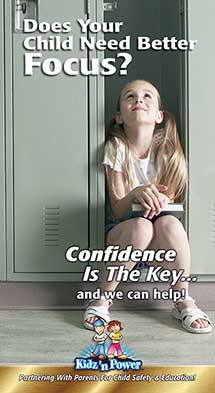
Study Shows Active Children
Focus Better In School
5 Ideas to Improve your Child's Concentration
To accomplish any task you need to be able to concentrate your attention for a time. It is a requirement for learning. Kids not only need to be able to focus on tasks but to stay in the one place long enough so they can listen to and follow instructions.
Most kids, from time to time, will experience some concentration or focusing difficulties. This is particularly true when they are over–tired, over–stimulated or over–loaded. However some children due to either their physiology or psychology have greater difficulty focusing on tasks and on people than others. Either they find settling into or starting a task a problem or they lose focus easily and leave tasks half done.
There are many things you can do at home to impact on children' concentration levels. Like any skill concentration can be enhanced and made automatic. The trick to effective concentration is to know what to concentrate on and what to filter out.
Here are five ideas you can use to help kids to concentrate better:
- Attend to their physiological needs: Most children and teenagers concentrate best after nine hours sleep so make sure they get sufficient sleep. Reduce sugar intake and increase protein levels with lean meat, almonds and eggs. This stimulates their dopamine levels which make concentration easier, particularly for lethargic kids. Frequent breaks for exercise have a similar effect.
- Remove distractions at home: List the distractions at home that may prevent your child from concentrating. These include; noise, people, lighting, fighting, fatigue and hunger. List ways to eliminate or reduce and work at them systematically.
- Create the mood for concentration: Calming background music, placing a fish tank (with fish) in a place of work and removal of fluorescent lights are some simple ways to make the environment more amenable for concentration. These strategies have been used successfully in overcoming concentration problems in many 'boy–friendly' schools.
- Introduce sequencing and organization activities: The link between sequencing and concentration is a strong one. Following recipes, setting the table and putting things in alphabetical order are great activities for kids whose have concentration difficulties. Board and card games (such as Concentration!!) promote children's ability to focus on tasks as well.
- Figure out what activities your child focuses on best: Some kids concentrate better when they are involved in hands–on activities, while others focus better when there are plenty of visual cues to help them. That's why teachers use hand signals such as hands on heads, and fingers on lips to indicate quiet. Look for activities that your child gets lost in; those activities that they can spend literally spend hours in. These activities enhance children's concentration levels.
Like any skill, concentration can be improved and made automatic. Anyone who has learned to drive a car will have had the experience of thinking, “How will I concentrate on all these things?” Extensive practice allows for the pathways of concentration.
It helps before you begin to assist kids to concentrate better if you pay close attention to their pattern of concentration and see if there are links between diet, their energy pattern, sleep and your own behaviors.


